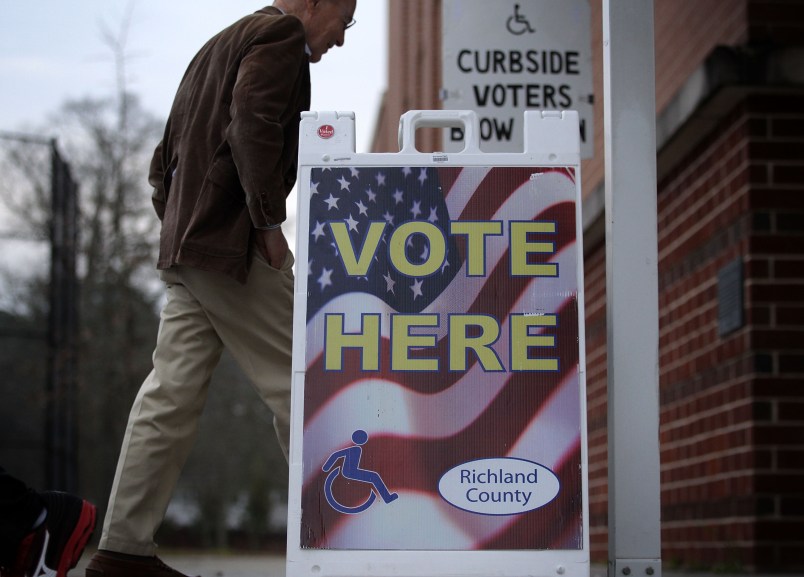PROVIDENCE, R.I. (AP) — A candidate for statewide office in Rhode Island told supporters not to volunteer or donate to his campaign: It was pointless since he had little chance of winning.
A candidate for Congress in Connecticut disappeared from his own campaign, saying he’d rather spend time coaching T-ball. The state Democratic Party in South Carolina, desperate for candidates, resorted to a robo-call asking for people to run.
Even in a year being portrayed as the most important midterm race in a generation, races for some of the most important positions in states across the country aren’t even contests. Democrats in red states and Republicans in blue states are failing to field viable candidates for a number of statewide offices and congressional seats, and in some cases they won’t have anyone on the ballot for powerful offices such as attorney general.
In Rhode Island, where Republicans have not won statewide office since 2006 and failed to run anyone for an open attorney general seat, GOP candidate for general treasurer Michael Riley told The Associated Press that he asked supporters not to give to his campaign because he didn’t want them to spend their hard-earned money on a lost cause.
“If you’re running as a Republican, you’re going to lose, period. That’s how you have to approach it. That’s how every Republican here approaches it,” said Riley, who also ran unsuccessfully for Congress in 2012.
Riley’s only campaign contribution was a $200 loan he made to himself. He has spent most of his campaign season the same way he would at any other time: working long days in his office as a financial adviser.
In neighboring Connecticut, where Democrats hold both U.S. Senate seats and all five U.S. House seats, Republican congressional candidate Dan Postemski was MIA on the campaign trail. A local newspaper was unable to find any sign of him even maintaining social media accounts. Postemski said he stepped up to run when no one else would against Democratic Rep. Joe Courtney, but then the GOP didn’t give him the support they promised.
“They abandoned me, so I abandoned them,” Postemski wrote on Facebook this month.
In South Carolina, Democrats in the heavily Republican state had said they planned to field a candidate for all statewide offices. They tried to drum up candidates in a robo-call earlier this year, when the state Democratic Party chairman recorded a message attacking Republicans and urging Democrats to contact the party and sign up to seek office.
But in the end, several statewide offices in South Carolina will appear on the ballot without a Democratic candidate. Just this month, its nominee for education superintendent withdrew following the revelation of a decade-old felony conviction.
The story is similar in Oklahoma, where Republicans control the legislature, all statewide offices and every congressional seat. The state Democratic Party didn’t even field an entire slate of candidates for statewide offices, opting to put most of its energy, and resources, into targeted legislative races and the state’s top prize in November — the open governor’s seat. That leaves candidates such as Anastasia Pittman, the nominee for lieutenant governor, massively outspent and unlikely to win.
The phenomenon is not limited to statewide office. In 2016, 42 percent of candidates running for state representative ran unopposed by a major-party candidate, although this year the number is lower. Experts say gerrymandered legislative districts drawn to give an advantage to one party or the other can make it difficult for candidates from the minority party.
But gerrymandering doesn’t explain why so many candidates for statewide races end up facing no opponent at all, or just token opposition.
In Texas, the last time a Democrat won a statewide race was 1994. The party has a glimmer of hope this year with superstar candidate Beto O’Rourke pulling in record amounts of money in his bid to unseat Republican Sen. Ted Cruz. But elsewhere on the ticket, Democratic gubernatorial candidate Lupe Valdez has failed to run a single TV ad, having raised just a little over $1 million.
Cal Jillson, a political science professor at Southern Methodist University in Texas, said when one party dominates for years like it has in Texas or Rhode Island, the minority party’s bench gets depleted to the point that are few viable candidates across the entire state.
The candidates that minority parties manage to scare up are often “much less than middling in terms of their abilities, their experience, their policy positions,” he said.
That can cause embarrassing problems for the minority party.
In New Mexico, the Republican candidate for secretary of state bowed out in June amid malpractice lawsuits against her law firm. In stepped failed congressional candidate Gavin Clarkson, who has raised eyebrows by accusing the Democratic incumbent of registering “zombies, aliens and canines” to vote.
Hawaii Republicans are bringing experienced staffers from the mainland to help professionalize campaigns amid a dearth of qualified candidates. The GOP is contesting only about a third of the legislative contests statewide.
The Illinois GOP this year couldn’t find a candidate to run in the 3rd Congressional District in Chicago, a district that’s been safely Democratic for decades. At the last minute, a Holocaust denier and Nazi sympathizer filed as a Republican. The GOP condemned him, but he’ll still appear on the Nov. 6 ballot as a Republican.



